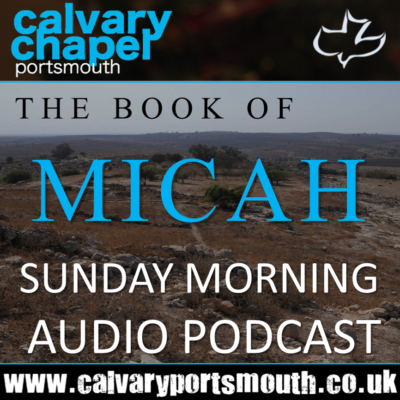This opening study in our verse-by-verse review of the book of Micah was given by pastor Barry Forder on the 30th January 2022 at Calvary Portsmouth.
We don’t know much about this prophet, who lived in a town called Moresheth Gath, around 20 miles southwest of Jerusalem near to the border to the Philistines, yet Micah (meaning ‘Who is like Jehovah’) spoke, initially to both the Northern kingdom and Israel and then to the Southern kingdom of Judah, for around 60 years. He was nothing if not persistent!; and his persistence paid off, for in Jeremiah 26:26-19:
16 Then said the princes and all the people unto the priests and to the prophets; This man is not worthy to die: for he hath spoken to us in the name of the Lord our God.
17 Then rose up certain of the elders of the land, and spake to all the assembly of the people, saying,
18 Micah the Morasthite prophesied in the days of Hezekiah king of Judah, and spake to all the people of Judah, saying, Thus saith the Lord of hosts; Zion shall be plowed like a field, and Jerusalem shall become heaps, and the mountain of the house as the high places of a forest.
19 Did Hezekiah king of Judah and all Judah put him at all to death? did he not fear the Lord, and besought the Lord, and the Lord repented him of the evil which he had pronounced against them? Thus might we procure great evil against our souls.
So as a result of Micah’s persistent preaching, Judah, under Hezekiah, repented! This makes Micah fairly unusual among the prophets as most of the prophets were ignored or silenced.
Jesus spoke in Luke 11:5-10 of the need for persistence. Be persistent in prayer; be persistent in preaching God’s word to those around you; be persistent in walking in the Way!
Micah lived and worked under the kings Jotham, Ahaz and Hezekiah around 750 – 687 BC. and was a contemporary (and most likely a friend) of Isaiah. There are a number of similarities between Micah and Isaiah and at timers they seem to borrow from each other.
After prophesying about it, Micah lived to see the Assyrians attack the northern kingdom in 722 BC. Micah uses this as an object lesson to try teach Judah that they were not immune to God’s wrath if they continued in their disobedience. Judah was troubled with idolatry and oppression of the people by the leadership. Micah speaks to the nation about all these things.
The book of Micah consists of three serious prophetical speeches each beginning with “hear”.
- The first part (Micah 1; Micah 2) starts with the call “Hear, all ye people; hearken, O earth, and all that therein is!” Then follows the announcement of God’s judgment over Samaria capital of the northern kingdom and over Jerusalem capital of Judah. The judgment is for their transgressions and injustices as well as their idolatry as they had rejected the serious warnings of God. This is why the whole land was desolated and no longer a place of rest for the people of God. The inhabitants would be chased out of the land but will be gathered again in a day to come.
- The second message (Micah 3; Micah 4; Micah 5) starts with the words “Hear, I pray you, O heads of Jacob, and ye princes of the house of Israel”. The leaders and prophets of the people are very much blamed. Then follows a description of the future glory of Israel in the reign of peace. In this section Bethlehem is announced as the birthplace of Messiah (chap. 5:2) who will be the strong helper of the people during the time of the end when Assyria will attack Israel.
- At the beginning of the third message (Micah 6; Micah 7) we read “Hear ye now what the Lord saith.” Then follows a remembrance to the love of God for His people and a remembrance to His rightful claims. The mention of God’s righteous judgment, the lamentation and the hopeful prospect of the prophet build the end of this short book. The last three verses belong to the most beautiful ones of Scripture.
Micah thus announces alternately judgment (chap. 1 – 3; 6:1 – 7:6) and grace (chap. 4 – 5; 7:7-20) for Israel.
One simple lesson is clear from the book of Micah: God is not mocked! He means what He says and says what He means.
In the midst of the talk of judgment there is an incredible prophecy at the end of Chapter 2 that looks forward to the days in which we live, when the nation of Israel would no more be split into two, but ‘all Israel’ would be assembled in Bozrah (Petra in modern day Jordan), and then be brought triumphantly back into the gates of Jerusalem by their Messiah – the One who breaks the chains and sets the captives free!
May you be blessed and encouraged by this study.


